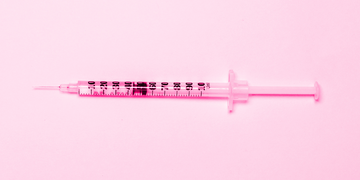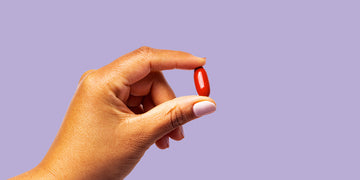How soon can I use a pregnancy test after IVF?

In vitro fertilization (IVF) is a commonly used fertility treatment, but how does it work? We’ll answer questions around the process of IVF, including when you should take a pregnancy test during IVF and how to tell if the IVF cycle was successful.
What is IVF? How does IVF work?
Here we will provide a very simplified overview of the basic steps and components of IVF. The IVF process begins with the stimulation of your ovaries to produce eggs. The fertility drugs you’re given tell your body to produce more than one egg a month. Your hormone levels and ovaries will be monitored regularly through blood tests and transvaginal ultrasounds during this step.
In preparation for egg removal, you’ll receive a hormone injection to speed the rate of egg maturity, and then when ready, the eggs will be removed from your ovaries. Egg removal surgery may cause cramping, but cramps usually disappear within a day.Once removed, the eggs that were retrieved will then be combined with viable sperm during the insemination portion in an attempt to fertilize the egg and create an embryo. Then, you’ll take medication to prepare the lining of your uterus for embryos. Embryo transfer will occur 3 to 5 days after fertilization.
Who is IVF recommended for?
As one of the more effective forms of Assisted Reproductive Technology (ART), your primary care provider may recommend IVF or referral to a Reproductive Endocrinology and Infertility (REI) specialist if:
- You’re over 40 years old
- The fallopian tube is blocked or damaged
- The function or production of eggs (or sperm) is impaired
- A genetic disorder is likely to be passed on to the child
- You have uterine fibroids or endometriosis
- You have cancer (or another health condition) and need fertility preservation
- You’re experiencing unexplained infertility
Are there risks for IVF?
There are a few potential risks of IVF:
- Ovarian hyperstimulation syndrome — when your ovaries produce too many eggs in response to the medications used during the ovarian stimulation process, leading to swelling or pain to your ovaries along with other symptoms like bloating and nausea
- Complications during egg retrieval, including bleeding, infection, or damage
- Emotional, physical, and financial stress
- Multiple births
- Low birth weight or premature delivery
- Ectopic pregnancy
- Miscarriage
Your medical provider will discuss these risks with you so that you can make an informed decision about IVF.
How soon after IVF can I test for pregnancy?
You can usually take a pregnancy test between a week and two weeks after the embryo transfer, but not necessarily with a home test. If you take an at-home pregnancy test after IVF, especially too soon, you might see a false positive or false negative result because of the medications that are used during the initial steps of IVF. It may take a couple of weeks for your system to normalize.
Ask your primary care provider about in-clinic pregnancy tests. In-clinic testing can usually confirm your pregnancy within two weeks after the embryo transfer, and your doctor will do a blood test around 12 -14 days following transfer. This blood test will measure the presence of and amount of hCG, a pregnancy hormone, in your body.
Your doctor will schedule a second blood test if the blood test measures hCG levels signifying a possible pregnancy. Three to four weeks after the embryo transfer, your primary care provider will schedule an ultrasound to confirm pregnancy. This ultrasound will identify the gestational sac. Later in your pregnancy, ultrasounds confirm the baby’s heartbeat.
How successful is IVF implantation?
Rates of success depend on a variety of factors. Your age, health, embryo development (with better chances when the embryo is more developed), and cause of infertility can all impact the results of IVF. You can use your eggs or donor eggs in IVF. Success when using your eggs
If you’re over 40 years old, your infertility specialist may recommend using donor eggs. IVF is also more likely to work if you’ve previously given birth. Your chances of getting pregnant with IVF are improved when you can produce eggs in quantity and quality. There are a few different health conditions that can impact egg quality and supply. Success rates improve when you take great care of your physical health. Chances of getting pregnant may be reduced if you consume too much caffeine, use alcohol or other drugs, smoke, or are of significant weight.
What are signs of a successful IVF implantation?
Symptoms can be complicated and misleading because they can overlap with other factors in your life. You will have extra hormones in your system as a result of the IVF process, and these can lead to pregnancy-like symptoms. You won’t know for sure whether IVF was successful without proper testing. You might also not have any symptoms, which can be confusing too. If you do experience them, possible symptoms include:
- Missed period
- Spotting or light bleeding
- Cramping, bloating, or tenderness (including sore breasts)
- Nausea or fatigue
- Changes to vaginal discharge
- Increased need to pee
When will I get my period if IVF doesn’t lead to pregnancy?
If you aren’t pregnant, you’ll likely get your period within a week (usually just a few days) after you stop taking progesterone. The first period following an unsuccessful IVF cycle might have a heavier flow.
Get in touch with your primary care provider if your period has abnormal bleeding or doesn’t happen at all. From here, you can figure out whether further cycles of IVF may be worth pursuing, keeping in mind financial and emotional costs. Make sure you go through at least one menstrual cycle between cycles of IVF.
Keep Reading

Common causes of infertility and miscarriage
Nov 2

What’s the deal with male infertility?
Sep 29

When should I start taking a prenatal vitamin?
Mar 10










